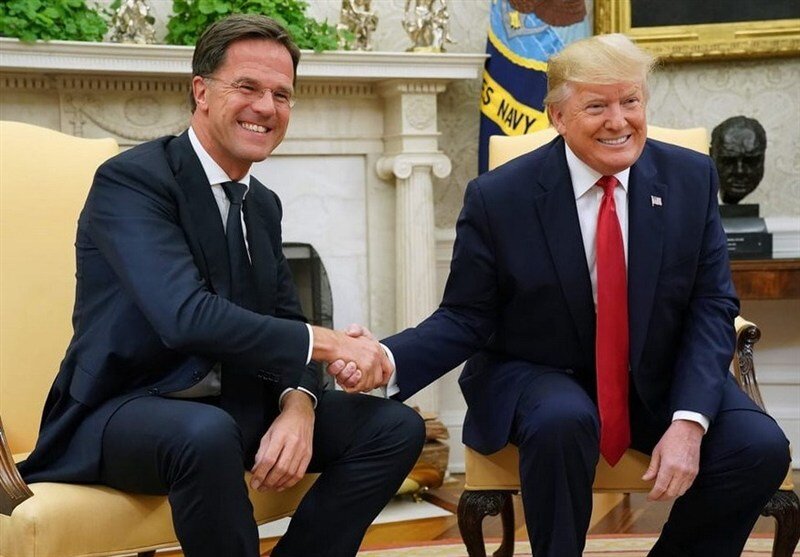NATO backing for US attack on Iran is astoundingly shameful
Is NATO seeking to protect members or endorse illegal invasions ?

TEHRAN - The decision by NATO to explicitly endorse unilateral U.S. military strikes against Iran represents one of the defining betrayals of its founding spirit.
NATO Secretary General Mark Rutte went ahead to even congratulate Donald Trump for what he called a "truly extraordinary" attack on Iran’s nuclear facilities. Rutte supported the attack, despite it lacking UN endorsement and never being justified under the premise of an imminent threat.
The U.S. attacked nuclear facilities in Fordow, Natanz, and Isfahan ten days after Israel made a surprise attack on Iran.
This dangerous trajectory of the alliance toward promoting offensive warfare contravenes Article 5 of the Washington Treaty, which prescribes a defense pact for its members. By giving legitimacy to this act of aggression, NATO has compromised its own moral standing, opened the doors to egregious double standards in Middle East policy, and stirred worldwide clamors that could emasculate the alliance as an authority for collective security.
Contradiction with NATO’s founding mission
The primary reason for NATO is the collective security of members as enshrined in the Washington Treaty. It is legitimized upon the principle that should an attack is waged on a member, then force may be imposed in response. Force is not to be used in anticipation of or as punishment against non-members. Various U.S. strikes in Iran, including those on the three nuclear sites mentioned above, were undertaken without any overt attack on a NATO member or any authorization of the Security Council under the UN Charter.
In celebrating these strikes, the leadership of NATO appears to have abandoned the very reason for which it was created, opening the question: Has NATO become a tool of the unilateral ambitions of the U.S. and its close allies instead of a protector of collective security?
Silence and complicity in the face of international law
The UN Security Council never authorized the U.S. strikes on the nuclear facilities in Iran. While Secretary General Rutte insisted that the actions did not violate international law, UN Secretary-General Antonio Guterres and other international figures have condemned the strikes as a perilous escalation and contrary to the prohibition on using force as enshrined in the UN Charter.
NATO's failure to condemn the attack not only risks legitimizing violations of international norms but also undermines its own credibility as a force for peace.
Double standards: Israel, Iran, and the question of security
NATO has a tough policy toward Iran. NATO repeatedly insists that “Iran must never develop a nuclear weapon”. Contrary to this claim, the U.S. intelligence community and Trump’s spy chief
Tulsi Gabbard concluded that Iran is not seeking to build nuclear weapons. Moreover, as a signatory to the NPT, Iran’s nuclear activities are subject to inspections by the International Atomic Energy Agency.
This is while NATO is engaged in a close relationship with Israel through cooperation in intelligence, technology, and military exercises. However, Israel has openly refused to acknowledge its nuclear weapons or join the Non-Proliferation Treaty (NPT).
This selective application of security concerns fuels accusations of double standards. Critics also point out that NATO’s unwavering support for Israel’s “right to self-defense” is not extended to Iran, and that the alliance has been conspicuously silent on Israel’s nuclear ambiguity and its record of violating international law.
Israel is widely believed to have about 100 nuclear warheads and refuses to accept a Middle East without nuclear weapons. Its heritage minister also suggested using nuclear arms against Gazans following the Oct. 7 attack.
Instrumentalization of NATO for U.S. domestic politics
The timing and tone of Rutte's congratulatory notes convey an impression that NATO leadership is much more interested in conspicuously courting Washington than upholding NATO principles.
This politicization undermines NATO’s independence and risks transforming the alliance into a vehicle for the ambitions of whichever U.S. administration is in power.
Ignoring global public opinion
NATO has officially endorsed the U.S. attacks, yet substantial public opposition exists to the strikes, especially in Europe, let alone in non-NATO countries. Many thousands protested in The Hague against both the U.S. attack and NATO's military posture, calling for de-escalation and diplomacy instead of war. Polls indicate that NATO is still supported among older Europeans, but skepticism rises — especially among youth who question NATO's significance and whether they want to align themselves with American foreign policy. By ignoring these voices, NATO not only risks alienating the very public it claims to be protecting but complicating the gulf between Western governments and their citizens.
The costs for Europe
Military escalation in the Middle East has huge potential costs for Europe. Regardless of the ongoing Western brinkmanship, any open military conflict with Iran could disrupt energy supplies, cause new waves of refugees, and generate new radicalization, and terrorism in Europe.
Wolfgang Ischinger, a German diplomat, has already mulled the impact of the wars in the Middle East on Europe citing that many European countries are somewhere between mild resentment and “a very deep sense of anger” over past Middle Eastern wars, which have created strained asylum systems, general political polarization, and security concerns.
In addition, as Europe grapples with the consequences of past and current Middle Eastern conflicts, they are becoming more reliant on the U.S. for military support, but this goes far beyond just helping with defense. By allowing NATO to support U.S. military operations, they may be ushering in a new era of instability that will be most prevalent in their respective capitals.
Leave a Comment